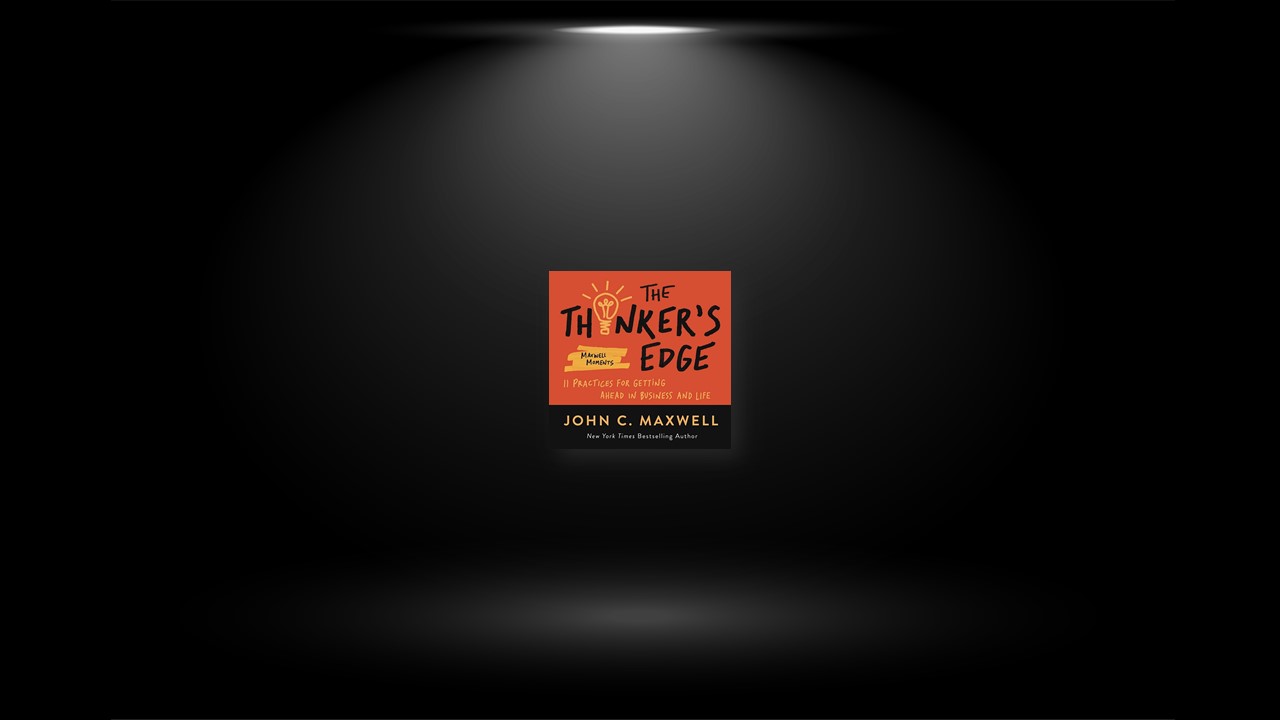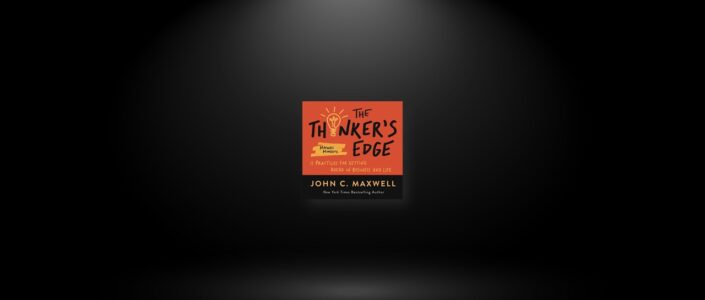SEE WIDER, DEEPER, AND FARTHER THAN OTHERS
Human beings are in the habit of seeing within the limits of their own world first. We tend to have tunnel vision. We see through the filter of our own experiences, biases, responsibilities, concerns, and agenda. But that limits us.
To improve your thinking and gain the thinker’s edge, you need to learn how to see the big picture. You need to see longer, wider, and farther than others do. You must make the effort to get outside of yourself and your own limited point of view. You can’t see the picture when you’re inside the frame.
To get outside of the frame, think beyond your own experience. Try to see how others see. Find out how others think. Become a good listener. Think beyond your personal agenda. Expand your world.
People who see wider, deeper, and farther accomplish more than narrow-minded people. They experience fewer unwanted surprises. They take into account people, problems, relationships, history, timing, chemistry, values, finances, creativity, and momentum. They see more, and before others do.
DEFINE WINNING FOR YOURSELF AND OTHERS
How do you define a win for your organization, business, department, team, or group? In most businesses, leaders define wins by the bottom line. Profit means success. But dollars should not always be the primary measure of success. That’s obvious when it comes to something like family. But it’s true even in business.
If you’re accustomed to measuring winning only in terms of finances, you are missing wins that are very important to you and your organization. Don’t you want more in life than financial success? Every activity has its own unique definition of winning, based on values and relationships as well as results.
You have the power to define winning for yourself. If you lead a team, you have the responsibility to do it. When you define winning before you start, you can measure outcomes very quickly and easily. You have a target. You can use it to ensure that all the little activities you’re doing line up with and contribute to your greater goal.
THINK DIFFERENTLY THAN OTHERS
Thinking differently than others can be very difficult, whether you’re a businessperson bucking company tradition, a new mother going against old wives’ tales, or a teenager ignoring the popular trends of the day. To go against popular thinking is to draw unwanted negative attention to yourself, especially in the age of social media.
It’s always easier to do what other people do and hope that they thought things out beforehand. But if you think that way, you can get stuck in a rut forever. Many people look for safety and security in popular thinking. They figure that if a lot of people are doing something, then it must be right. It must be a good idea. If it’s accepted by most people, then it probably represents fairness, equality, compassion, and sensitivity, right? Not necessarily.
Popular thinking loves the status quo. It puts its confidence in the idea of the moment and holds on to it with all its might. People may say that there’s safety in numbers, but that’s not always true. When you follow the crowd, accept popular thinking without questioning, and don’t try to think differently than others, you will always have to settle for mediocre results.
BELIEVE IN POSSIBILITIES MORE THAN OTHERS
Do you find the idea of believing in possibilities—or “possibility thinking”—unrealistic? Or overly optimistic? Or out of date? If so, consider it in a different way: The will to succeed. Belief in yourself. Confidence in your ability. Faith. But whatever term you call it, the truth is that people who believe they can’t accomplish something, don’t. People who believe they can, can! It’s not guaranteed that they will. But at least they have a chance. That’s the power of believing in possibilities.
If you believe you can do something, you have already won much of the battle. If you believe you can’t, then it doesn’t matter how hard you battle, because you’ve already lost. When you believe you can do something difficult—and you succeed—it opens many doors for you. If you open yourself up to believing in possibilities, you open yourself up to other greater possibilities. One open door leads to another.
STAY FOCUSED LONGER THAN OTHERS
The ability to focus for long periods of time can bring energy and power to almost anything you do, whether physical or mental. If you’re learning how to pitch a baseball and you want to develop a good curveball, you must focus on your technique, not just throw the ball randomly. If you need to refine the manufacturing process of your product, focused thinking will help you dig down to develop the best method. If you want to solve a difficult mathematics problem, you’ll need focused thinking to break through to the solution.
The greater the challenge, the more focused thinking time you will need to overcome it. Focused thinking removes distractions and mental clutter so you can concentrate on an issue and think with clarity. If you don’t know what your target is, how will you ever hit it?
Focusing your thinking helps you to know the goal—and to achieve it.
FACE THE HARD TRUTHS BEFORE OTHERS
Do you avoid facing hard truths? If you want to be successful, you need to be willing to do it. If you lead other people, at work or at home, you have a responsibility to do it.
Facing hard truths gives you credibility as a leader. Realistic thinking helps your team buy into you and your vision. Leaders who are continually surprised by the unexpected quickly lose credibility with their team. Leaders who examine hard truths earn respect. Facing hard truths isn’t pretty. But you can learn to appreciate realistic thinking because of what it can do for you.
Hard truths don’t go away just because you won’t look at them. Looking at your life and career realistically helps you identify your target and develop a game plan. Actions always have consequences; realistic thinking helps you determine what those consequences could be.
If you’re not willing to face hard truths, here’s the good news: You are probably very positive and have a high degree of hope. Here’s the bad news: Hope is not a strategy for success.
When you know your goal and you see that it’s threatened, you become better at seeing what’s important. It clarifies your thinking and sharpens your decision-making.
REFLECT AND LEARN MORE OFTEN THAN OTHERS
The pace of life in our culture does not encourage anyone to stop and reflect. But without reflection, we take things for granted. We lose perspective. And we lose opportunities to learn. As a result, we don’t grow as much as we could, achieve as much as we could, take our potential as far as we could, or succeed the way we could.
Reflective thinking enables you to distance yourself from the intense emotions of particularly good or bad experiences and see them more objectively. Experience has value. Job experience. Life experience. Yet, experience alone will not add value to your life. What has value is the insight you gain from reflecting on that experience and learning from it. Reflective thinking turns experience into insight.
Any experience becomes valuable when it informs or equips us to meet new experiences. One of the best things you can do for yourself is to find a place where thinking and reflecting come easily.
Wherever you pick must be easy to get to, otherwise you won’t use it. It must also provide quiet and solitude. Distraction and reflection simply don’t mix. It’s not the kind of thing you can do well near a television, in an open office, while your phone is pinging you, or with children in the same room.
As you find a place to think your thoughts, your thoughts will find a place in you.


